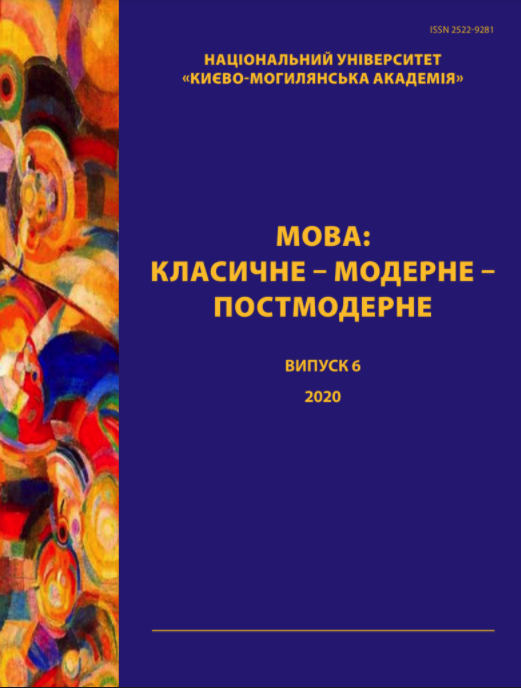Мова мережевого фольклору як засіб опору інформаційній агресії
DOI:
https://doi.org/10.18523/lcmp2522-9281.2020.6.32-49Ключові слова:
інформаційна війна, російсько-українська війна, мережевий фольклор, постфольклор, мова опору, мова ворожнечіАнотація
Однією з форм емоційного захисту суспільства в умовах інформаційної агресії стає мережевий фольклор. Тому дослідження набору мовних одиниць, уживаних у таких постфольклорних текстах, набуває особливої актуальності, оскільки дає можливість виявити важливі суспільні реакції на події в умовах збройного протистояння та, відповідно, сформовану мовну картину світу. У процесі аналізу виділено головні мовні засоби творення комічного ефекту у змалюванні образу ворога.
Матеріал надійшов 26.05.2020
Посилання
- Boyte, K. J. (2017). An analysis of the social-media technology, tactics, and narratives used to control perception in the propaganda war over Ukraine. Journal of Information Warfare, 13 (1), 72–86. Retrieved from: https://www.researchgate.net/publication/316858860.
- Denysiuk, Zh. (2017). Postfolklor internet-komunikatsii v aksiolohichnomu vymiri [Post-folklore of Internet communication in the axiological dimension]. Kyiv: NAKKKiM [in Ukrainian].
- Fabiszak, М. (2007). A Conceptual Metaphor approach to war discourse and its implications. Poznan: Wydawnictwo Naukowe UAM.
- Fialkova, L. & Yelenevskaya, M. (2015). The crisis in Ukraine and the split of identity in the Russian-speaking world. Folklorica, XIX. https://doi.org/10.17161/folklorica.v19i1.5721
- Goble, P. (2016). Russian national identity and the Ukrainian crisis. Communist and Post-Communist Studies, 49 (1), 37–43. https://doi.org/10.1016/j.postcomstud.2015.12.006
- Goriacheva, D. (2016). Understanding the “Ukrainian crisis.” Metaphors used by Ukrainian, German, and British leaders in 2014–16. Ideology and Politics, 1 (6), 86–152.
- Gorshunov, Ju. V., & Gorshunova, E. Ju. (2014). Jetnicheskie stereotipy i jarlyki kak sredstvo degumanizacii [Ethnic stereotypes and labels as a means of dehumanization]. Vestnik Bashkirskogo universiteta [Bulletin of Bashkir University], 19 (3), 915–919. Retrieved from https://cyberleninka.ru/article/n/etnicheskie-stereotipy-i-yarlyki-kak-sredstvo-degumanizatsii/viewer [in Russian].
- Hryhorenko, I., & Volovenko, I., (2019). Novitnii ukrainskyi folklor u merezhevii komunikatsii: typolohichni kharakterystyky ta tematyka [Modern Ukrainian folklore in network communication: typological characteristics and themes]. Intercultural Communication, 1 (6), 37–52. https://doi.org/10.13166/inco/103643 [in Ukrainian].
- Jantunen, S. (2014). Kill, capture ... or neutralize? How operational planning changes the language of communicating war. Journal of Information Warfare, 13 (1), 72–86. Retrieved from https://www.jinfowar.com/tags/language-war.
- Kyryliuk, O. (2019). Osoblyvosti mikropolia “vorozhi viiska” u strukturi asotsiatyvno-semantychnoho polia “voroh” (na materiali dyskursu rosiisko-ukrainskoi informatsiinoi viiny) [Peculiarities of the microfield “hostile troops” in the structure of the associative-semantic field “enemy” (based on the discourse of the russian-ukrainian information war)]. Visnyk KNLU. Seriia Filolohiia [Bulletin KNLU. Series Philology], 22 (2), 58–68 [in Ukrainian].
- Lakoff, G. (1992). Metaphor and war: The metaphor system used to justify war in the gulf. Journal of Cognitive Semiotics, IV (2), 5–19. Retrieved from https://www.degruyter.com/downloadpdf/j/cogsem.2009.4.issue-2/cogsem.2009.4.2.5/cogsem.2009.4.2.5.pdf.
- Nykytchenko, K. (2016). Zaminne ta analohichne slovotvorennia yak sposoby tvorennia okazionalizmiv doby postmodernizmu [Substitutional and analogical word-formation as a means of creating occasionalisms of the postmodern era]. Naukovyi visnyk Skhidnoievropeiskoho natsionalnoho universytetu imeni Lesi Ukrainky [Lesya Ukrainka Eastern European National University Scientific Bulletin], 5, 56–60 [in Ukrainian].
- Pochepcov, G. (2019). Kognitivnye vojny v socmedia, massovoj kul’ture i massovyh kommunikacijah [Cognitive wars in social media, mass culture and mass communications]. Kharkov: Folio [in Russian].
- Pynnoniemi, K., & Racz, A. (Eds.). (2016). Fog of falsehood: Russian strategy of deception and the conflict in Ukraine. Finnish Institute of International Affairs. Retrieved from: http://www.sfpa.sk/wp-content/uploads/2016/05/FIIAReport45_FogOfFalsehood.pdf.
- Silberstein, S. (2002). War of words. Language, politics and 9/11. London; NewYork: Routledge.
- Smoor, L. (2017). Understanding the narratives explaining the Ukrainian crisis: identity divisions and complex diversity in Ukraine. Acta Universitatis Sapientiae, European and Regional Studies, 11 (1), 63–96. https://doi.org/10.1515/auseur-2017-0004
- Strukov, V. & Hudspith, S. (2018). Russian culture in the age of globalization. New York: Routledge.
- Szostek, J. (2017). The power and limits of Russia’s strategic narrative in Ukraine: The role of linkage. Perspectives on Politics, 15 (2), 379–395. https://doi.org/10.1017/S153759271700007X
- Vasil’ev, A. D., & Podsohin, F. E. (2016). Informacionnaja vojna: lingvisticheskij aspekt [Information war: linguistic aspect]. Politicheskaja lingvistika [Political Linguistics], 2 (56), 10–16 [in Russian].
- Vilchynska, T. (2017). Kontsept – viina: osoblyvosti movnoi obiektyvatsii u hazetnomu teksti [“Concept “war”: peculiarities of lingual instantiation in newspaper text]. Linhvistychni studii [Linguistic Studies], 34, 110–114 [in Ukrainian].
- Wierzbicka, A. (1997). Understanding cultures through the Keywords: English, Russian, Polish, German, Japanese. New York; Oxford: Oxford University Press.
- Yavorska, H. (2016). Kontsept “viinaˮ: semantyka i prahmatyka [Concept “war”: semantics and pragmatics]. Stratehichni priorytety [Strategic Priorities], 1 (38), 14–23 [in Ukrainian].
##submission.downloads##
Опубліковано
Як цитувати
Номер
Розділ
Ліцензія
Авторське право (c) 2020 Olha Kyryliuk

Ця робота ліцензується відповідно до Creative Commons Attribution 4.0 International License.
Автори, які публікуються у цьому журналі, погоджуються з такими умовами:
а) Автори зберігають за собою авторські права на твір на умовах ліцензії Creative Commons Attribution License CC BY 4.0, котра дозволяє іншим особам вільно поширювати (копіювати і розповсюджувати матеріал у будь-якому вигляді чи форматі) та змінювати (міксувати, трансформувати, і брати матеріал за основу для будь-яких цілей, навіть комерційних) опублікований твір на умовах зазначення авторства.
б) Журнал дозволяє автору (авторам) зберігати авторські права без обмежень.
в) Автори мають право укладати самостійні додаткові угоди щодо поширення твору (наприклад, розміщувати роботу в електронному репозитарії), за умови збереження посилання на його першу публікацію. (Див. Політика Самоархівування)
г) Політика журналу дозволяє розміщення авторами в мережі Інтернет (наприклад, у репозитаріях) тексту статті, як до подання його до редакції, так і під час його редакційного опрацювання, оскільки це сприяє виникненню продуктивної наукової дискусії та позитивно позначається на оперативності та динаміці цитування опублікованої роботи (див. The Effect of Open Access).




